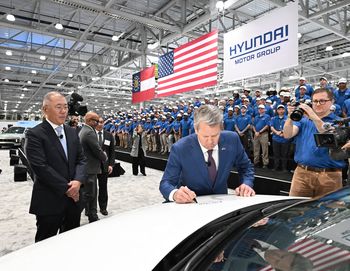Shift in Production Strategy: Hyundai’s EV Export Decline
Hyundai Motor Group has experienced a significant drop in the export of electric vehicles (EVs) from South Korea to the United States. According to recent industry data, exports fell by nearly 90 percent year-on-year during the first five months of the year. This decline is attributed to the automaker’s strategic shift in production, moving the manufacturing of America-bound vehicles to its new U.S. facility.
According to data from the Korea Automobile & Mobility Association (KAMA), Hyundai Motor and Kia combined exported 7,156 EVs to the United States between January and May this year. This marks an 88 percent decrease compared to 59,705 units exported during the same period in the previous year.
The numbers reflect the lowest level for the January to May period since Hyundai Motor Group began accelerating its electrification strategy in 2021. The drop in exports is primarily due to the company’s efforts to localize EV production in the United States. In the first half of the year, Hyundai completed the construction of its dedicated EV plant, Hyundai Motor Group Metaplant America, in Georgia. This facility produced 28,957 units of the Ioniq 5 and 4,187 units of the Ioniq 9.
Challenges in the U.S. EV Market
In addition to the shift in production, Hyundai and Kia have also faced challenges in the U.S. EV market. According to industry tracker Wards Intelligence, the group sold 44,555 EVs in the United States in the first half of 2025, a 28 percent decline from the previous year. Industry analysts suggest that the outlook for the remainder of the year may be even more challenging due to the scheduled termination of U.S. EV tax credits in September under the One Big Beautiful Bill Act, a major tax reform bill spearheaded by former U.S. President Donald Trump.
A recent report by the Federation of Korean Industries (FKI) estimated that Hyundai Motor Group could lose up to 45,828 units in annual U.S. EV sales, equivalent to $1.95 billion in sales. The U.S. market accounted for 36 percent of Hyundai Motor Group’s total EV exports last year, highlighting the significance of this market for the company.
Strategic Implications and Future Outlook
The move to local production in the U.S. represents a key part of Hyundai’s long-term strategy to reduce dependency on overseas manufacturing and better serve the American market. However, the current challenges, including the potential loss of tax incentives, could impact the company’s growth trajectory in the region.
Despite these hurdles, Hyundai continues to invest in innovation and expansion. The company recently unveiled the Ioniq 6 N, its first high-performance EV sedan, as part of its broader efforts to strengthen its presence in the EV segment. Additionally, Hyundai has been actively involved in various initiatives, such as donating to flood relief efforts and engaging with government officials to address concerns related to trade policies and tariffs.
As the automotive industry evolves, the competition among automakers intensifies, particularly in the EV sector. With the ongoing changes in policy and market dynamics, Hyundai Motor Group will need to navigate these challenges carefully to maintain its position in the global EV landscape.







